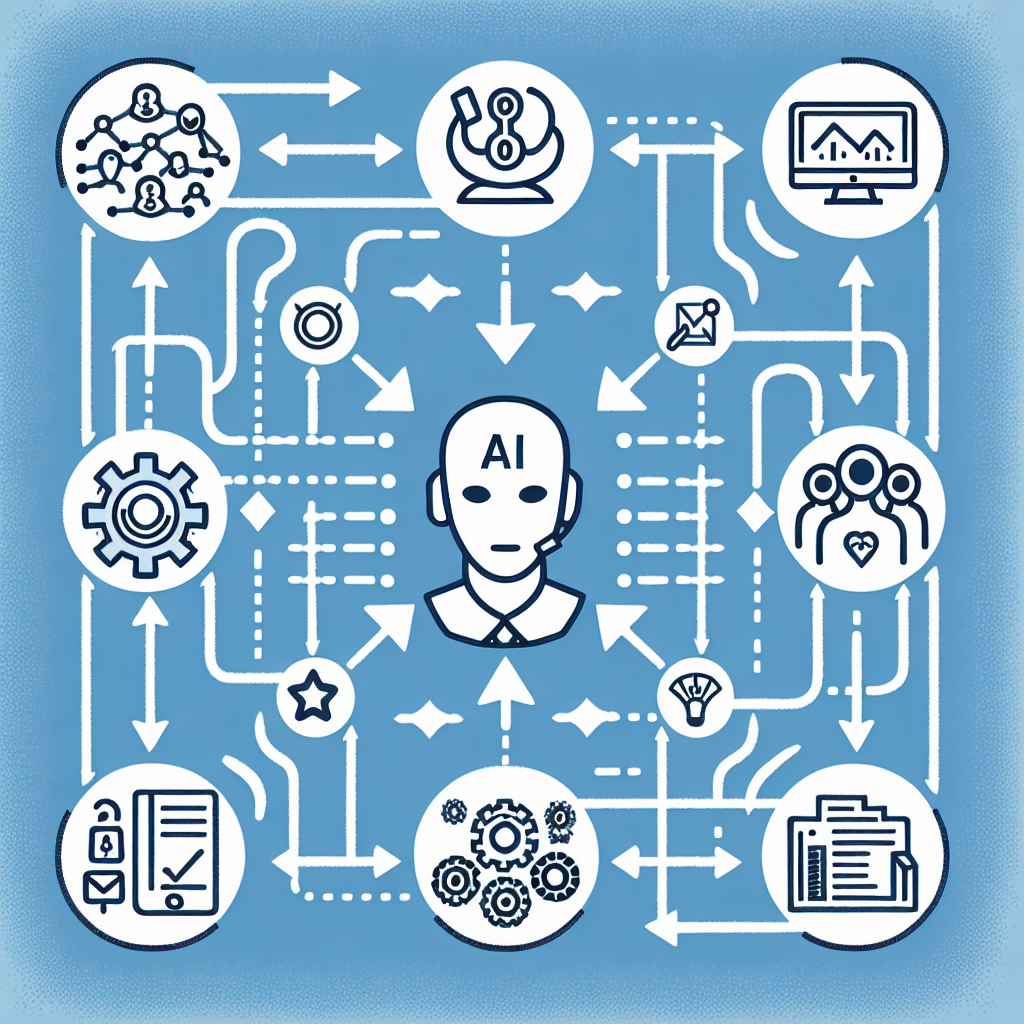
The advent of Artificial Intelligence (AI) is rapidly transforming the face of various sectors, and telephony is no exception. AI-powered technologies have infiltrated our telephone systems, streamlining services and elevating the user experience to remarkable heights.
One standout application of AI in telephony is in managing complex, multi-step phone transactions, whittling down traditionally intricate processes to a far simpler, less time-consuming task. A burgeoning example of such implementation is the Interactive Voice Response (IVR) systems that leverage AI-powered voice recognition technology to interactively engage with customers and address their needs efficiently.

With AI in the mix, these transactions are no longer mundane, multi-tiered tasks that test the patience of users. Instead, users can now wade through these steps smoothly, enabling swift issue resolution or efficient information retrievals. This concept of AI in phone transactions is not a mere possibility of the future, but very much a reality of our present, shaping our daily telecommunication experiences.
Significantly, the significance of AI in telephony extends beyond simplifying complex phone tasks. AI promises a potent blend of speed, accuracy, and round-the-clock accessibility that lends businesses a substantive edge. By automating repetitive tasks, phone-based customer service can focus on more value-added responsibilities, thereby improving overall productivity. For businesses with a massive inflow of phone-based interactions, an investment in AI technologies could potentially herald substantial benefits.
Phenomenally, AI has the potential to make a revolutionary impact in aiding the handling of complex, multi-step phone transactions. The journey of AI in telephony is just beginning and promises to tread an inspiring trajectory, panning over unique solutions that further cement AI's indispensable role in our evolving communication landscape.
As businesses seek new ways to refine their customer service efforts, Artificial Intelligence is poised to play a significant role. AI can manage sophisticated, multi-step phone calls, greatly enhancing the user experience and the efficiency of service delivery. Key features that make this possible include Natural Language Processing (NLP), Machine Learning, and Real-time Decision-Making capabilities.
Natural Language Processing is AI’s ability to understand and interpret human speech as it is spoken naturally. This allows AI phone systems to comprehend customers’ requests, questions, and complaints without them needing to speak in a certain pattern or use specific phrases. Moreover, NLP empowers these systems to process languages along with their nuanced phrases, slang, and accents, thereby accommodating a diverse range of callers. Learn more about Natural Language Processing here.
Machine Learning is another important integral function of AI. It facilitates the system’s ability to learn from past transactions, improving its competence over time. With each interaction, Machine Learning algoriths analyze the data, detecting patterns and adjusting actions accordingly. In the context of phone transactions, AI learns more about a customer's needs and preferences, allowing it to provide improved, personalized service. Find out more about Machine Learning here.
Apart from these, the Real-time Decision-Making capabilities of AI serve to make instantaneous decisions during calls. If a customer mentions a problem, the AI analyzes the issue in real time, and presents possible solutions instantly. This eliminates the need for human intervention, reduces hold time, and speeds up resolution time substantially. Discover more about Real-time Decision-Making here.
In conclusion, the fusion of these key AI features - Natural Language Processing, Machine Learning, and Real-time Decision-Making - is what allows complex phone transactions to be handled with precision, efficiency and a high degree of customer satisfaction.
The convergence of AI technology and business operations simplifies complex, multi-step phone transactions. AI is the seed-bed of innovation for swift, seamless, and on-demand interactions between businesses and customers. This strategic alliance enhances communication efficiency and responsiveness by a significant measure.
At the heart of this functionality are the business tools - the Customer Relationship Management systems (CRM) and Enterprise Resource Planning solutions (ERP). By integrating AI phone systems with CRM and ERP, businesses can establish a centralized hub for real-time synchronization and data sharing. This integration effectively propels automated decision-making, the cornerstone of today's responsive business landscape.

Modern AI phone systems are designed to collect, categorize, and analyze the data generated from each phone transaction. Data insights from these transactions can be channeled into the CRM and ERP tools instantaneously. With this automated data feed, it becomes easier to track customer interactions, predict future trends, strategize business decisions, and importantly, personalize customer experiences - all of which are vital instruments for business growth.
On the flip side, AI phone systems can leverage the data from CRM and ERP tools to generate customer profiles when they call, offering a 360-degree view of the caller's history. This allows personalized communication, efficient query handling, relevant service suggestions, and proactive problem resolutions, thereby reclaiming substantial time and resources.
A significant aspect of AI-phone systems integration with business tools is the complete overhaul of workflow efficiency. Routine tasks such as scheduling appointments, creating tickets, or updating customer information can now be automated, eliminating the need for human intervention. Automation frees up the workforce to focus on more crucial, creative aspects of the business, fostering a dynamic and innovative work culture.
The transformative power of integrating AI phone systems with critical business applications unlocks phenomenal operational efficiency and robust growth prospects. With AI integration, businesses can harness the power of data, streamline operations, and ultimately improve their bottom line. As AI technology evolves, these connective collaborations will only become more integral to our digital businesses of the future."
In today's dynamic world, several organizations have adopted AI to streamline intricate, multi-step phone transactions. Let's explore a few success stories.
American Express, widely recognized for its high-quality customer service, integrated AI into their phone transactions system. They faced formidable challenges such as reducing transaction time, improving response rate, and decreasing human error.
The organization took advantage of AI in action and disclosed a significant reduction in these challenges post-implementation. The AI was able to learn from numerous transactions, thereby reducing friction points and making transactions more fluid and efficient.
Humana, a well-known health insurance giant, decided to solve the complexity of their customer phone communications using AI. With a wide demographic range, the traditional customer telephone experience was poorly received due to long waiting times and the complexity of getting answers to specific queries.
AI deployment resulted in a swarm of positive changes, including advanced call-routing, recognition of caller intent, and efficient information delivery. This led to improved customer satisfaction and reduced operational costs.
Nuance Communications, a leading provider of AI and voice recognition solutions, undertook AI adoption in their transactions. The company encountered challenges with voice recognition in different accents and languages while handling global phone transactions.
However, after successfully integrating AI and machine learning, they were able to deliver advanced, customized caller experiences, greatly improving their services while saving substantial costs.
These examples highlight the transformational potential of AI in handling complex, multi-step phone transactions. They demonstrate how challenges can be turned into opportunities, ultimately leading to improved customer experiences and more efficient operations.
As we navigate the rapidly evolving landscape of digital transformation, one of the most notable advancements is the use of Artificial Intelligence (AI) in telephony systems. As we shift towards a more digital-centric society, the future trends in AI Telephony hold vast potential for revolutionizing communication, reducing human effort, and improving customer service. This technology is expected to radically simplify complex, multi-step phone transactions and deliver quicker, more efficient communication systems in many aspects.

Beyond their current capabilities, AI-powered telephony systems are primed to rise to a new level with the incorporation of advanced AI and machine learning algorithms. These algorithms can handle complex customer interactions, learning from each conversation and providing personalized service based on the users' needs. Such advancements may even lead to the creation of predictive AI telephony systems, capable of anticipating user needs and providing solutions even before requests are made. This truly highlights a distinct shift from reactive to proactive customer service.
Additionally, the rise of Chatbots in Telecommunication signifies a move towards AI-driven conversations that can efficiently handle multi-step transactions, even in the absence of a human operator. Their application ranges from addressing common queries to engaging in intelligent, context-aware conversations.
The future of telephony also lies in human-machine collaboration. Human-AI Collaboration in these domains will allow AI systems to complement human abilities, boosting efficiency and reducing potential errors. In an industry where customer satisfaction is paramount, this collaboration can lead to unprecedented levels of service quality, availability, and responsiveness.
Whether it is enhancing customer experience, streamlining operations, or even cutting costs - the integration of AI in telephony systems is set to revolutionize the industry. As we move forward into the digital future, these cutting-edge advancements in AI telephony collect a significant impetus, paving the way for novel innovations in the field.
With such potential at its fingertips, the future landscape of AI in telephony systems promises not only greater technological sophistication but also unprecedented improvements in the way businesses connect with their customers.
Incorporating AI into handling complex, multi-step phone transactions heralds a transformation in customer service, setting a higher standard for efficiency and convenience. Recent studies underscore the massive potential in automating these operations, freeing up human agents to tackle more nuanced issues, consequently boosting workplace productivity.
The benefits of AI in phone transaction systems are many and substantive. First, AI enhances customer experience by facilitating faster, more accurate service, fostering customer loyalty. AI systems can operate round-the-clock, negating the constraints of human work-shifts. Predictive customer behavior analysis provided by AI also paves the way for more personalized interactions, evolving the customer-engagement dynamic.
However, the challenges shouldn't be overlooked. The concern of job displacement is valid, although it's important to highlight that AI empowers, rather than replaces, human agents. Concerns about data privacy and integrity also persist, with businesses needing to establish robust security measures to counter potential threats. Moreover, mismanaged AI can result in rather impersonal customer interactions, emphasizing the need for a delicate balance between automation and human touch.
But, adopting and integrating AI into business operations has become vital for firms to remain competitive in today's fast-paced digital landscape. Every business, large or small, has to recognize the value and inevitability of AI. They must work actively to navigate through the complexities of AI implementation, from ethical considerations to employee re-orientation, to secure their place in the future marketplace.
While AI continues to revolutionize phone transaction systems, businesses need to stay abreast of the latest advancements in AI and machine learning to maximize their benefits. It's clear that AI is here to stay, and the sooner businesses adapt to it, the better equipped they'll be to tackle the challenges that the future holds.
Start your free trial for My AI Front Desk today, it takes minutes to setup!








